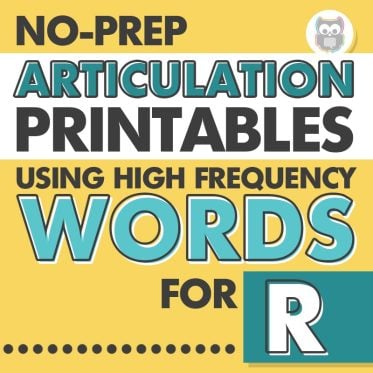
I LOVE what I do. I love the students I get to work with. I love making an impact. I love encouraging, supporting, teaching, and helping my students advocate for themselves. I plan, prep, prompt, and play.
Want to know one thing I don’t do? Pretend to understand unintelligible children when I really have no idea what they’ve just said.
You know the students… the ones that say “nevermind” or “I give up” when asked to repeat themselves. Or even worse, the ones who aren’t understood and then gradually talk less and less and less. Or the ones who demand you repeat what they’ve said word for word so they can confirm you actually understand what they said and aren’t just another pretending adult.
All of these students are the result of too many adults that have taught them that what they say, especially when it’s a burden on the adult to understand, just isn’t that important.
I believe what our students say is incredibly important.
That’s why I refuse to give up on a student and simply say, “Cool” or “Yeah” or “Nice” or nod my head or smile.
What do I do?
I teach strategies! Having communication breakdowns is a fantastic time to work out some strategies that your students can use in a variety of settings. Have them repeat themselves. Have them find a picture or item related to what they are saying. Ask them, “Can you show me?”. Give them some verbal reminders to use all of their sounds. Have them say it slowly. Provide them a communication book or AAC system to aid their verbal productions. Ask them to give the first letter of an important word.
And if after all of that you still can’t understand, at least be honest with the kid. It’s okay to say, “I’m sorry! I’m having a hard time!” or “I don’t understand”.
After doing this several times with students, they come to understand that I won’t give up on them and they develop increased persistence when not understood the first time. Oftentimes, this carries over to a variety of other adults, peers, and settings.
So please, stop pretending you know what your students say when you don’t! Train parents and staff to do the same. What our students say is important and we need them to know that. As SLPs, this is not an option. It is what we do.
Let me know, what do you do when you can’t understand what a student is saying?
{thanks for reading}
FREE Book Lists

Subscribe to download this FREE resource, perfect for sending home!




















Thanks for this reminder! My three-year-old is speech delayed, and I often say, “Really?” or “Cool!” when I have no idea what she’s said…so I appreciate the strategies! Thanks!
Yes! It can be so hard to remember to do but once you do it consistently, I think it really makes a difference! Thanks for commenting! 🙂
After three tries, I ask if they can show me or tell me using other words. Sometimes this works, though often it doesn’t, as language may be a component (what other word could be said for pop tart? And describing around it can be tricky, lots of language and more artic problems, comes in a blue box, eat it for breakfast, cherry with icing). When unable to get the message, I encourage practice, “man, this is hard, we need to work harder practicing your sounds, so this can be easier, and next time I will understand you”. For kiddos who experience this a lot, it may be time to use a communication book (Podd or Lamp) to help them use categories and language supports to get their message across.
I love this! What a great system!
I love this post! I work with phonologically impaired preschoolers. I try my best to figure out what they are saying and try to be honest when I can’t. I have texted parents asking for help if they are talking about something personal! I love when their face lights up when you finally “get it”!. I never really think of sharing this with the parents though….I’m going to add this to my talking points for open house this year. Thanks!
You’re welcome!! Thanks so much for commenting and I’m so glad you thought it was useful. I totally agree about putting forth extreme effort to understand my unintelligible little ones. LOVE seeing how excited they get when I finally understand! 🙂
I appreciate this communication train. I had a few students this year who were highly unintelligible. That’s why I’m reading this blog. Want to do better for them and all of your ideas are wonderful. One thing I did was I gave my two students notebooks for drawing. When questioning didn’t help bring clarity to our conversational exchange, I would have them draw a picture. As they filled in what they were talking about, most often the unknown would be revealed. I would leave the notebook in the classroom for the teachers to use as well. So much fun!! For those students who enjoy drawing, this was helpful.